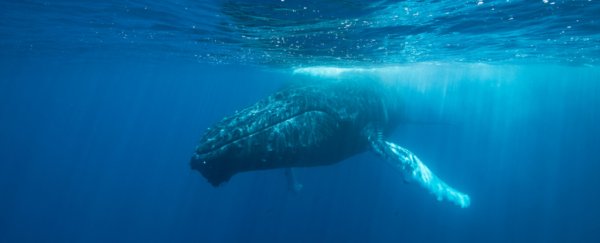Humans have got a lot to answer for when it comes to interfering with nature. And we can add noisy cargo ships to the rather shameful list of ways we're affecting the lives of the animals we share the planet with.
A new study reveals low-frequency hums from this maritime traffic are causing whales to stop their own singing calls, sometimes for up to 30 minutes after ships have passed by.
While the whales weren't found to be adjusting their calls in any other way, that period of silence is troubling.
The researchers also noted that fewer male humpbacks were singing in the shipping lane areas compared with the surrounding parts of the ocean.
"Humpback whales seemed to stop singing temporarily rather than modifying sound characteristics of their song under the noise, generated by a passenger-cargo liner," say the researchers.
"Ceasing vocalisation and moving away could be cost-effective adaptations to the fast-moving noise source."
The research was carried out around the Ogasawara Islands in Japan, and involved 26 male singers in total (females and calves don't sing) – between one and three calling whales a day.
One passenger-cargo ship passes through the region each day, and because the area is relatively free of traffic, it's ideal for studying the impact this has in isolation.
Either the male whales reduce the number of singing calls they make, or they shut up completely while the ship goes past, according to the underwater acoustic measurements carried out by the researchers.
We're still not sure whether or not long-term exposure to the sounds of ships has a negative impact on these whales, but this is a good starting point for future research, says the team.
There seems to be a 500 metre (1,640 feet) buffer around the shipping lane that whales are reluctant to make noise in, the researchers report, though the effects of the passing vessel were noted to have an impact on whales up to 1,200 metres (3,935 feet) away.
The study was carried out across the traditional mating season during 2017, February to July – the calls are used to attract mates, and as a result it's possible that passing ships are interfering with the social structure of the humpbacks.
"It's one more bit of evidence confirming that the noise humans make has a negative impact on all sorts of aspects of the life of marine mammals," Spencer Fire from the Florida Institute of Technology, who wasn't involved in the study, told CNN.
As the team notes, ambient underwater noise caused by humans continues to rise, with cargo and passenger traffic the main offenders.
Scientists are particularly concerned about how this affects cetaceans (whales, dolphins and porpoises) as they use sound to navigate, to communicate, and to find food.
Also this week, conservationists attending a conference held by the International Maritime Organisation in the UK have called for slower shipping routes to cut greenhouse gas emissions as well as underwater noise pollution.
While this study was carried out in a remote part of the ocean, the consequences on whale calling in a more crowded region could be more severe. Maybe it's about time we started treading – or sailing – more lightly.
"Responses may differ where ship traffic is heavy, because avoiding an approaching ship may be difficult when many sound sources exist," note the researchers.
The research has been published in PLOS One.
